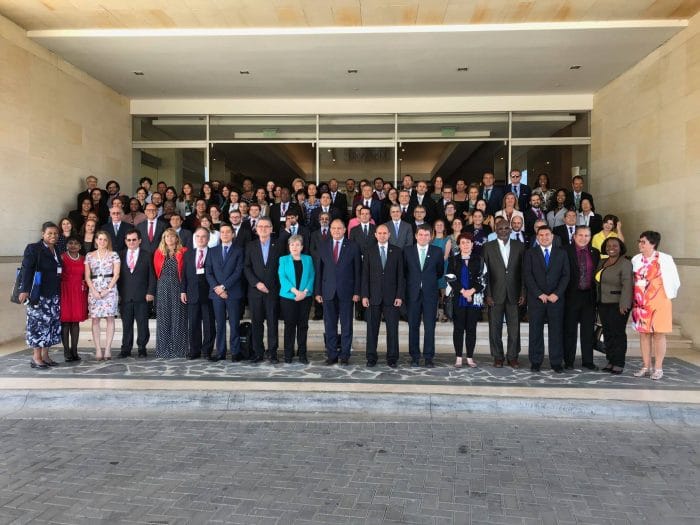
On May 29th, the Global Legal Empowerment Network organized a webinar where we had the opportunity to talk and discuss with experts about the content and relevance of the recently adopted Escazú Agreement, a powerful tool to strengthen environmental democracy, advance justice in environmental matters and protect environmental defenders in Latin America and the Caribbean.
For the webinar, the following experts participated: Gabriela Burdiles, from Fiscalía del Medio Ambiente (FIMA, Chile), Valeria Torres, from the Division for Sustainable Development and Human Settlements of the Economic Commission for Latin America and the Caribbean (CEPAL), Andrea Sanhueza, elected representative for the public during the negotiation process for the Agreement, Andrés Napoli, from Fundación Ambiente y Recursos Naturales (FARN, Argentina), and Manolo Morales, from Corporación de Gestión y Derecho Ambiental ECOLEX (Ecuador).
As Valeria Torre highlighted, the agreement contributes in an important way to the fulfillment of the Agenda 2030, by focusing on vulnerable groups and access to environmental justice for everybody, in equal terms and without discrimination. During the conversation, Valeria Torre explained how the instrument, the origins of which can be found in the Declaration on the application of Principle 10 of the Rio Declaration on Environment and Development of 2012, is a result of a negotiation process that started in 2014 and ended with the adoption of the final text on 4 March 2018. From 27 September 2018 until 26 September 2020, the agreement will be open to the signing by all countries in the region, as well as to the ratification, acceptance and approval by those states that have already signed the instrument. Subsequently, from 27 September 2020, the agreement will be open for accession (single step for joint signature and ratification) for all those countries in the region that have not yet signed the instrument. The agreement will ‘enter into force on the ninetieth day after the date of the deposit of the eleventh instrument of ratification, acceptance, approval or accession’ (CEPAL, 2018, 36).
The Escazú Agreement, as Manolo Morales highlighted, has been designed in and for the region, with one of the principal elements during the formulation process being public participation (participation of civil society). As explained by Andrea Sanhueza, civil society, organized through The Access Initiative (TAI), has been a key actor in the negotiation process of the instrument. The participation model employed during the process, the panelist argued, was unprecedented, as civil society was not only able to send documents and lobby, but could also actively intervene in the meetings, having the same rights as any other actor. 20 organizations from 16 different countries participated, creating a solid network which aims to continue working to achieve the largest number of state signatures and ratifications.
The instrument is structured around 4 main pillars: access to environmental information, participation in environmental decision-making processes, access to justice in environmental matters, and human rights defenders in environmental matters. Andrés Napoli referred to the access to justice-related part of the instrument as building due process in environmental matters, as it includes:
- The provision of guarantees for access to justice
- Paths to access justice
- Special bodies and procedures
- Measures to facilitate access
- Specific actions for governments to strengthen the right to access to justice
Examples of such provisions are, amongst other, the formulation of effective, timely and transparent procedures that are not prohibitively expensive (CEPAL, 2018, 27), the establishment of ‘measures to minimize or eliminate barriers to the exercise of the right of access to justice’ (CEPAL, 2018, 28), or the existence of ‘competent State entities with access to expertise in environmental matters (CEPAL, 2018, 27).
There is no doubt that one of the elements that make the agreement a cornerstone for the region is the way in which it regulates the protection of human rights defenders in environmental matters. Manolo Morales explained how, to a large extent, the participation of civil society in the negotiation process allowed for the unprecedented inclusion of the subject of defenders in environmental matters in the instrument. With this, as highlighted by Valeria Torre and Manolo Morales the Escazú Agreement will be the first binding instrument for the protection of human rights defenders in environmental matters; a landmark in building robust environmental democracy in the region. As Manolo Morales argued, provisions are established to:
- ‘Guarantee a safe and enabling environment for persons, groups and organizations that promote and defend human rights in environmental matters’ (CEPAL, 2018, 29)
- ‘Recognize, protect and promote all the rights of human rights defenders in environmental matters’ (CEPAL, 2018, ), including substantive rights such as the right to life, personal integrity, or free movement, amongst many other
- ‘Take effective measures to prevent, investigate and punish attacks, threats or intimidations that human rights defenders in environmental matters may suffer’ (CEPAL, 2018, 29)
The Escazú Agreement is a crucial and needed instrument to protect all those persons that risk their lives every day to defend justice and environmental human rights. For this reason, we should celebrate, disseminate and promote its ratification and entry into force. We also hope other regions take this instrument as an example to move forward, because without the protection of defenders there is no #justiceforall.
If you want to keep updated and receive more information regarding the Escazú Agreement, you can register with the Regional Public Mechanism. In addition, in the following link you will be able to access the complete webinar (in Spanish).
References
CEPAL. (2018). Regional agreement on access to information, public participation and justice in environmental matters in Latin America and the Caribbean. United Nations. See: https://repositorio.cepal.org/bitstream/handle/11362/43583/1/S1800428_en.pdf
